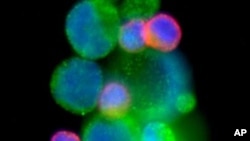Scientists have developed a new test for prostate cancer that may help patients and their doctors make difficult treatment decisions. But identifying the most aggressive and dangerous prostate cancers still won't be easy.
A widely-used blood test is often used to screen for potential prostate cancer, but University of Michigan researcher Scott Tomlins says it has its limitations.
"The PSA test, prostate-specific antigen, is just that - it's very specific for prostate tissue, but it's not specific for prostate cancer."
Men with a PSA score that is high or increasing may have prostate cancer. But the PSA result could also mean an enlarged but non-cancerous prostate gland.
So doctors often recommend a needle biopsy of the prostate. The procedure can be unpleasant, and worse, it often doesn't provide definitive guidance on whether or how to treat the patient.
So Tomlins and his colleagues are evaluating a new test that would identify a genetic anomaly that is linked to cancer.
"And what it does is," Tomlins says," it puts two genes together - TMPRSS2 and ERG - that sort of function as an 'on' switch in the prostate, that's what TMPRSS2 does, and then ERG is a gene that cause cells to become cancerous. And so you basically turned on a bad gene in the prostate."
Tomlins says this particular gene pair is unique to prostate cancer - it doesn't show up in normal prostate tissue, and it isn't found in other cancers. But it doesn't occur in all patients.
In this new study, the researchers tested the urine of prostate patients for TMPRSS2:ERG plus PCA3, another genetic marker associated with prostate cancer.
The men in the study had suspicious PSA levels and had been referred for a needle biopsy.
Researchers found that the urine test helped predict whether the high PSA score was caused by cancer, and also helped predict how aggressive the cancer was.
But Tomlins says that, although the new test can help doctors make a diagnosis and guide treatment, it has its limitations.
"I think the idea that you'll have a test that is 100 percent specific for cancer, it's 100 percent sensitive, and it will only identify the type of cancer that's aggressive and needs to be treated - I think that we are very far away from that, and I don't know if we'll ever be able to do that."















